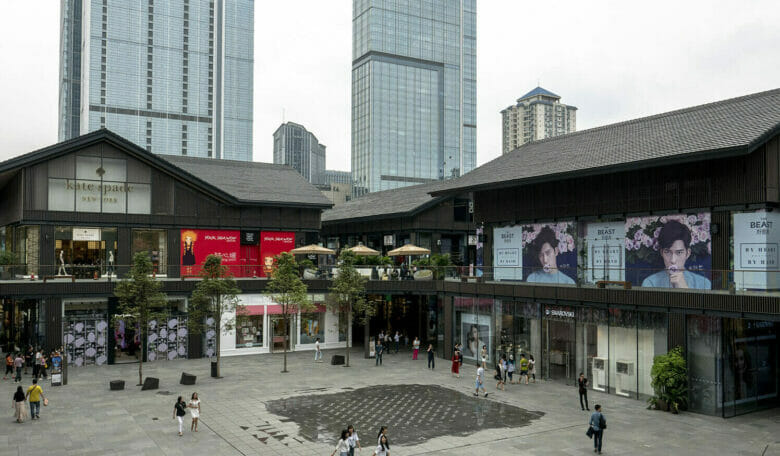
Sino-Ocean sold its stake in a Chengdu project for RMB 5.6 bil in December (Getty Images)
China’s twentieth-largest developer by contracted sales suffered a net loss of RMB 15.9 billion ($2.3 billion) in 2022, as the mainland housing crisis dented the income of even the largest state-backed players.
Sino-Ocean Holdings Group announced in its annual financial results released on 30 March that its revenues last year fell 28 percent compared to 2021, to total just RMB 46.1 billion, while its gross profit in 2022 fell 79 percent to RMB 2.4 billion.
“The real estate market in China experienced extreme fluctuations in 2022,” the company said in the report. “It was a tough long year for all in the industry. Real estate enterprises in distress, customers holding back, sales decline and financing difficulties fed negative vibes to each other, creating a deteriorating cycle.”
Sino-Ocean’s financial challenges led its auditor to raise questions regarding the company’s ability to continue as a going concern, although the developer has been selling off assets to help raise cash.
Auditor Raises Going Concern Questions
While some state-backed developers have been able to leverage superior access to financing resources to acquire assets during the market downturn, Sino-Ocean’s auditors pointed to signs of stress in the company’s balance sheet.

Sino-Ocean chairman Li Ming
BDO Ltd, which replaced PriceWaterhouseCoopers in checking Sino-Ocean’s books from November, noted in an extract included in the company report that the developer’s current cashflow indicated that, “material uncertainty exists that may cast significant doubt on the Group’s ability to continue as a going concern and therefore, the Group may not be able to realise its assets and discharge its liabilities in the normal course of its businesses.”
While management expressed confidence in Sino-Ocean’s ability to meet its obligations, during 2022 the company’s short-term debt due within 12 months increased by 104 percent to RMB 38.1 billion, while its cash and cash equivalents had decreased by 78.7 percent to RMB 4.6 billion, resulting in a cash-to-short-term debt ratio of 0.12.
Additionally, the company also had trade and other payables of approximately RMB 13.8 billion, of which about RMB 7.52 billion are due within 2023.
However, the group’s management showed confidence in its liquidity position, given its 1.40 times ratio of current assets to current liabilities and its unutilized credit facilities of approximately RMB 165.2 million.
Challenging Environment
Sino-Ocean, which is controlled by state-run insurers China Life and Dajia Insurance, said that its 2022 losses were driven by a range of factors, led by the overall slowdown in China’s real estate market as well as the continued impact of the COVID-19 pandemic.
These challenges led to a decrease in both revenue and gross profit margin, as well as an increase in impairment provisions for property projects.
Another factor contributing to the losses was a decline in the performance of its joint ventures and associated companies. Additionally, the company suffered from losses due to foreign exchange fluctuations caused by the depreciation of the Chinese renminbi.
Sino-Ocean’s disappointing results were revealed on the same day that China’s largest developer by sales for 2022, Country Garden Holdings, disclosed its first loss ever, while number two player Poly Developments and Holdings announced the next day that its net profit for last year had fallen by 33 percent.
Asset Sales Prop Up Top Line
Data from CRIC, a division of mainland real estate agency e-House, show that Sino-Ocean’s contracted sales for 2022 fell by 26 percent last year to total RMB 65.3 billion, while its recognised sales slid by 33 percent to RMB 37.1 billion.
The company squeezed out more cash by selling off a number of assets during last year, including agreeing to sell its half-stake in Sino-Ocean Taikoo Li Chengdu to its partner, Swire Properties, for RMB 5.5 billion in December. That sale reflected a 10 percent discount from the property’s valuation.
In October the company raised RMB 230 million by selling its remaining 10 percent stake in the China Life Financial Centre office tower in Beijing to two units of its largest shareholder, China Life. In June Sino-Ocean sold its 34.5 percent holding the the Yuan Yang Rui Center (also known as Rayzone) project in Beijing to Ping An Life Insurance.
With more cash coming in, Sino-Ocean made timely payment on $20.6 million in subordinated perpetual USD bond interest just the day before it announced its financial report, after news reports this past month indicated that the company had informed bond holders on 17 March that it would not be able to meet that obligation when it became due on 21 March.
Noting that it expects the government to roll out more measures to prop up demand, Sino-Ocean said, “We are confident that the industry will be revived,” while adding that the real estate environment this year “will be better than 2022 in terms of policies and credit.”
However, the management cautioned that it may take some time for companies to realise improved cashflow and investment capacity and said that, “The industry still needs to tread carefully for a while.”
Leave a Reply